Loraine Boettner Collection (8 vols.)
Digital Logos Edition
Overview
Loraine Boettner set forth a clear vision for Reformed and evangelical theology for the modern era. He articulated classic Reformed orthodoxy for a new generation, and possessed the rare gift of clearly explaining the complex principles of theology without sacrificing academic rigor. Best-known for his volumes on the doctrine of predestination and Roman Catholicism, Loraine Boettner explained and popularized the Reformed faith for a broad audience.
The 8-volume Loraine Boettner Collection contains eight of Boettner’s most popular works, including The Reformed Doctrine of Predestination, The Millennium, and his best-selling Roman Catholicism. As a gifted theologian and prolific writer, Boettner took seriously the task of bringing theological reflection to bear on the most pressing issues Christians face. From contemporary issues—such as just war theory—to theological problems—such as eternal reprobation—Boettner writes with a generous spirit and utmost fidelity to Scripture and the Reformed confessions. This collection is ideal for pastors, students, and anyone interested in Reformed theology.

- Bibliographies
- Numerous indexes arranged by subject and author
- All Scripture references linked to Greek texts and English translations in your digital library (if you own them)
- Title: Loraine Boettner Collection
- Author: Loraine Boettner
- Publisher: P&R
- Volumes: 8
- Pages: 2,101
This title is included in the following collections
You can save when you purchase this product as part of a collection.
Logos 8 Reformed Silver Legacy...
$349.99$349.99Logos 8 Reformed Gold Legacy L...
$849.99$849.99Logos 8 Reformed Platinum Lega...
$1,499.99$1,499.99Logos 5 Reformed Platinum Lega...
$1,499.99$1,499.99
- $1,499.99
- $2,999.99
- $2,999.99
- $2,999.99
- $4,749.99$3,562.49
- $4,749.99
- $23,999.99$17,999.99
- $21,749.99
- $24,999.99
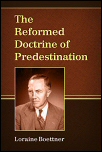
The doctrine of predestination—as controversial as it is—has received comparatively little thoughtful attention, and is rarely understood even in Reformed circles. It is a doctrine, however, contained in the creeds of confessions of most evangelical churches, and Christians would do well to explore it more thoughtfully.
The tendency of our enlightened age is to look upon Calvinism as outdated and obsolete. Because of this contemporary attitude toward Calvinism, and because of the general lack of thoughtful and well-reasoned writing on Reformed doctrines, The Reformed Doctrine of Predestination is of great importance. In this volume, Boettner does not aim to set forth a new system of theological thought, but rather gives a re-statement of Reformed theology. He affirms Calvinism as both the teaching of the Bible and as an important part of the church’s history.
Not only a clear and cogent presentation of the Reformed doctrine of predestination but of all the great distinctive doctrines of the Reformed faith. . . . The practical importance of Calvinism is stressed. The chapter on Calvinism in history will prove illuminating to many.
—Christianity Today
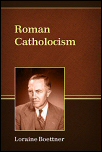
Roman Catholicism sets forth the differences between evangelical Protestantism and the Roman Catholic Church, both in regard to doctrine and in regard to the practical effects of Catholicism and Protestantism in the lives of ordinary believers. Boettner urges the evangelical community to draw from the apostolic church and from Scripture to discern the proper mode of belief and practice. He shows that the beginnings of Protestantism lie not in the fourteenth century, but in the belief and practice of the Early Church.
Roman Catholicism contains chapters on the central aspects of Roman Catholicism:
- Church government
- The priesthood and laity
- The Apocrypha
- The Vulgate
- Apostolic succession
- Mary
- The Mass
- The confessional
- Purgatory
- Papal infallibility
- Celibacy
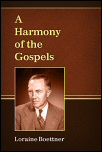
It has been said that the greatest service anyone can render is to make more available the riches of grace found in Christ. Boettner’s Harmony of the Gospels makes more readily available the material found in the Gospels, and makes more interesting and rewarding the time spent in Bible study. Divided into 136 chapters and systematically arranged, A Harmony of the Gospels weaves together material from Matthew, Mark, Luke, and John to form one continuous narrative that includes everything in the Gospels. It is compiled in chronological order, and offers a compact and readable glimpse into the life and work of Jesus Christ.
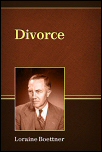
What does the Bible say about divorce and remarriage? How should the church respond to broken marriages? In this concise volume, Boettner investigates the teaching of Scripture and the vision of God set forth in Reformed theology to outline a set of clear guidelines which Christians can use to begin thinking about divorce and remarriage.
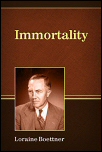
Death and the future are by their very nature mysterious. Many people tend to avoid serious discussion or thought on the subject of death, yet every person knows that in the normal course of events, sooner or later, death will happen. Nothing is more certain about life than the fact of death—all human history and experience point to that conclusion.
This volume deals with the issue of life after death, not out of fear of the future, but from a natural, God-given desire to enter into the larger life and destiny which we instinctively feel is ahead. Immortality is divided into three sections: one each on physical death, immortality, and the intermediate state. Along the way, Boettner writes on biblical terminology—such as Sheol and Hades—purgatory, soul sleep, and much more. He also weaves numerous Scripture references and commentary from Reformed theologians into his narrative.
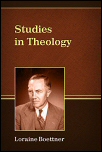
Studies in Theology examines the core doctrines of Christianity with utmost fidelity to Scripture. Boettner addresses for a general audience the significant theological topics of his era—and ours—and defends the classic Reformed positions. The chapters of this book originally appeared as independent books or articles in Christianity Today and The Evangelical Quarterly during the 1930s and 40s.
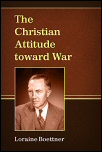
What causes war? Is there such a thing as a just war? What are the premises of pacificism? Many have claimed that all war is wrong at all times—wrong for the defenders and for the aggressors—and that even when waged with the purpose of restraining evil, war produces greater evils than those against which it is directed.
In response to these multiple viewpoints, Boettner writes this compelling volume, first published in 1940. Boettner brings biblical and historical data to bear upon issues relating to war, just war theory, pacifism, weapons of mass destruction, and much more. His crisp analysis of these and other issues makes this book a valuable and enduring statement on the ever-crucial matters of war and peace.
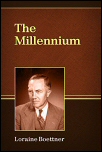
Broadly speaking, there are three general systems which profess to set forth the teaching of Scripture regarding the Second Coming of Christ and the future of God’s kingdom: postmillennialism, amillennialism, and premillennialism. Each holds that Scripture is the word of God and is authoritative. Each holds to the same concept of the death of Christ as the sacrifice to satisfy divine justice and the only ground for salvation. Each holds that there will be a future, visible, personal coming of Christ. Each affirms the resurrection of the body, the judgment seat of Christ, rewards for righteousness, and punishment for the wicked. The differences arise because of distinctive methods of interpretation of Scripture employed by each method.
This study on the millennium defines each system of belief as clearly as possible by exploring the writings of representative theologians, the principles of interpretation. Boettner also explains the various conceptions of the anti-Christ, the Great Tribulation, and the rapture. He also explains the history and beliefs of dispensationalism.
Loraine Boettner was born in 1901 in Linden, Missouri. He studied agriculture at the University of Missouri, but graduated with a B.S. after transferring to Tarkio Presbyterian College. In 1925, Boettner began his studies at Princeton, where he was influenced by the writings of Charles Hodge. He graduated from Princeton Theological Seminary with a Th.B. in 1928 and a Th.M. in 1929. He later received an honorary Doctor of Divinity degree in 1933 and a Doctor of Literature degree in 1957. From 1935 to 1939, Boettner also worked at Christianity Today, and worked at the Library of Congress and for the Internal Revenue Service. He continued to write and publish theological works—his most popular The Reformed Doctrine of Predestination, based on his Th.M. thesis, and Roman Catholicism. He died on January 3, 1990.
Reviews
2 ratings

Mr. Youngblood
6/13/2019

George Crocker
2/2/2016
I received all of the above books for $10 from Boettner himself while I was still in college and before I went on to seminary. He did that as a ministry to students..you wrote him a letter and he would send you all his books (hardback at the time) for the cost of shipping. The books are very good and especially useful for those who are just beginning to study and trying to understand the reformed faith. The only book that may not be so hot..so to speak..was his book on Roman Catholicism ..which is very weak arguments or as some say not correct in many areas. Still the other books in the set are still well worth reading. He has now gone to be with the Lord so do not expect to get the great deal I and others did.